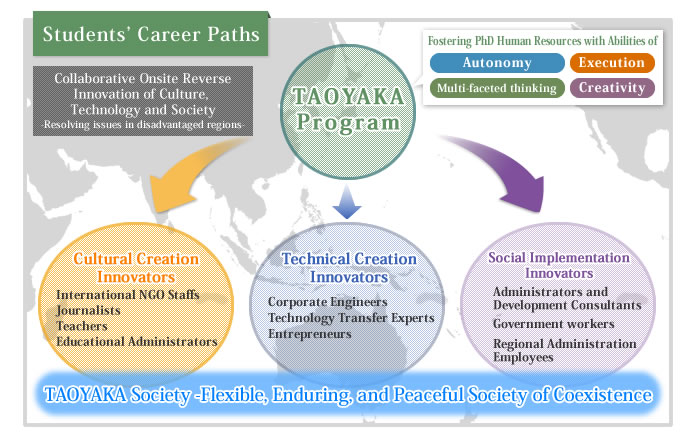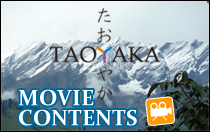About the Taoyaka Program
Program for Leading Graduate Schools
To equip excellent students with a broad perspective and originality, and train them to be leaders who are globally successful in a wide range of fields in industry, academia and government, we have gathered together the best teachers and students from within and outside of Japan. Our graduate education has been radically reformed, resulting in consistent, cross-disciplinary doctoral degree programs that enjoy participation from members of industry, academia and government, and guarantee a world-class level of quality. This Program supports such reform: its aim is to drive the formation of a graduate school fitting of the highest level of education.
Basic Principles
Today there still exist throughout the world villages that are unable to receive basic living services such as educational and medical services, regions experiencing endless conflict over the right to use water or land, and communities without an adequate supply of energy or resources. Conversely, the mature society of Japan is currently facing different social issues: marginal villages that do not have adequate access to educational or medical services, and day-to-day transportation issues in island and semi-mountainous areas that have no guaranteed mode of transporting people or goods. Today’s global society needs to be a flexible, enduring, and peaceful society of coexistence where such disadvantages, positioned on the dividing line between economic growth and maturity, are accepted as conditions for us to coexist and cohabit this Earth.
In recent years, the use of cell phones is evident even amongst villagers in remote villages in far outlying developing nations. Compact solar cell panels are used to generate power, and there is increasing use of LED light bulbs, which can convert to light a tiny amount of power stored in a small battery. With the spread of such technology, the monotonous, long, dangerous nights in developing nations have been changed into meaningful time filled with energy. State-of-the-art science and technology developed in advanced nations and supporting today’s society now has the potential to dramatically transform not only advanced nations but societies in developing nations as well. We will work closely with regions facing problematic issues such as these, develop proposals based on their needs, expand the potential of such state-of-the-art science and technology, to implement onsite reverse innovation that more effectively leads society in the right direction.
Onsite reverse innovation is a means to overcome the issues faced by disadvantaged regions based on those regions’ unique societies and cultures that have grown diversely over time and space. It is the starting point of a cycle whereby the required advanced science and technology is identified (developed) and nurtured (applied/implemented) in the regions. We believe that a cycle of science and technology led by the culture of the region concerned is the way forward for the creation of a flexible, enduring, and peaceful society of coexistence. Based on this concept, we will train the three types of innovators required to ensure that the appropriate state-of-the-art science and technology is applied and implemented in onsite innovation. It is expected that these innovators, who may also be called multicultural coexistence instigators, will act as leaders in the creation of a convivial society to address mutually-created cultural, technical and social innovation onsite, and contribute to the resolution of issues regarding disadvantages in regional communities.
Three courses for creating a flexible, enduring, peaceful society
Students will belong to one of three courses that have been established based on Hiroshima University’s vast experience (Cultural Creation Course, Technical Creation Course, Social Implementation Course), where they will acquire advanced specialist skills. Courses are selected based not on students’ majors as undergraduates, but rather in accordance with their reasons for joining the program and career plans. Students from the three respective courses will then form teams, and take up the challenge to resolve multicultural coexistence issues in disadvantaged regions, from a multilateral perspective of cultural creation, technical creation and social implementation.
Cultural Creation Course
Type of Degree: Doctor of Literature, Doctor of International Cooperation, Doctor of Philosophy, Doctor of Education
Students will learn about the fundamental elements and approaches in regional research, and obtain wide-ranging specialist knowledge on the south Asia region and global culture. They will also develop the ability to address comprehensive issue resolution, including regional comparisons and developmental issues.
Technical Creation Course
Type of Degree: Doctor of Engineering, Doctor of Philosophy
Students will gain wide-ranging specialist knowledge, from electrical/electronic engineering including semi-conductors and electricity, to system information studies such as sensing and image processing. They will also develop the skills required to execute technology development that matches the needs of regional societies.
Social Implementation Course
Type of Degree: Doctor of Philosophy, Doctor of Engineering, Doctor of International Cooperation
The students will gain an understanding of the effects and benefits of science and technology on society, and acquire specialist knowledge of planning required for social implementation and economics. They will also develop the ability to find and analyze compound issues in regional societies and lead them to implementation.






